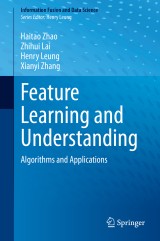Details

Feature Learning and Understanding
Algorithms and ApplicationsInformation Fusion and Data Science
|
CHF 165.50 |
|
| Verlag: | Springer |
| Format: | |
| Veröffentl.: | 03.04.2020 |
| ISBN/EAN: | 9783030407940 |
| Sprache: | englisch |
Dieses eBook enthält ein Wasserzeichen.
Beschreibungen
<p>This book covers the essential concepts and strategies within traditional and cutting-edge feature learning methods thru both theoretical analysis and case studies. Good features give good models and it is usually not classifiers but features that determine the effectiveness of a model. In this book, readers can find not only traditional feature learning methods, such as principal component analysis, linear discriminant analysis, and geometrical-structure-based methods, but also advanced feature learning methods, such as sparse learning, low-rank decomposition, tensor-based feature extraction, and deep-learning-based feature learning. Each feature learning method has its own dedicated chapter that explains how it is theoretically derived and shows how it is implemented for real-world applications. Detailed illustrated figures are included for better understanding. This book can be used by students, researchers, and engineers looking for a reference guide for popular methods of feature learning and machine intelligence.</p><br>
Chapter1. A Gentle Introduction to Feature Learning.- Chapter2. Latent Semantic Feature Learning.- Chapter3. Principal Component Analysis.- Chapter4. Local-Geometrical-Structure-based Feature Learning.- Chapter5. Linear Discriminant Analysis.- Chapter6. Kernel-based nonlinear feature learning.- Chapter7. Sparse feature learning.- Chapter8. Low rank feature learning.- Chapter9. Tensor-based Feature Learning.- Chapter10. Neural-network-based Feature Learning: Autoencoder.- Chapter11. Neural-network-based Feature Learning: Convolutional Neural Network.- Chapter12. Neural-network-based Feature Learning: Recurrent Neural Network.<br><p></p><p></p><p><br></p>
<p><b>Haitao Zhao</b> is currently a full professor at the School of Information Science and Engineering, East China University of Science and Technology (ECUST), Shanghai, China. His research interests include feature extraction, representation learning, feature fusion, classifier design and their applications in image processing and computer vision.</p>
<p><b>Henry Leung</b> is a professor of the Department of Electrical and Computer Engineering of the University of Calgary. His current research interests include information fusion, machine learning, IoT, nonlinear dynamics, robotics, signal and image processing. He is a Fellow of IEEE and SPIE. <br></p><p><b>Zhihui Lai</b> was a Postdoctoral Fellow at the Bio-Computing Research Center, Shenzhen Graduate School, Harbin Institute of Technology (HIT) in 2011-2013. He is now a full professor at the College of Computer Science and Software Engineering, Shenzhen University. <br><b><br>Xianyi Zhang </b>is a postgraduate at the School of Information Science and Engineering, East China University of Science and Technology (ECUST), Shanghai, China. His research interests include pattern recognition, machine learning and image processing.<br></p><br><p></p>
<p><b>Henry Leung</b> is a professor of the Department of Electrical and Computer Engineering of the University of Calgary. His current research interests include information fusion, machine learning, IoT, nonlinear dynamics, robotics, signal and image processing. He is a Fellow of IEEE and SPIE. <br></p><p><b>Zhihui Lai</b> was a Postdoctoral Fellow at the Bio-Computing Research Center, Shenzhen Graduate School, Harbin Institute of Technology (HIT) in 2011-2013. He is now a full professor at the College of Computer Science and Software Engineering, Shenzhen University. <br><b><br>Xianyi Zhang </b>is a postgraduate at the School of Information Science and Engineering, East China University of Science and Technology (ECUST), Shanghai, China. His research interests include pattern recognition, machine learning and image processing.<br></p><br><p></p>
This book covers the essential concepts and strategies within traditional and cutting-edge feature learning methods thru both theoretical analysis and case studies. Good features give good models and it is usually not classifiers but features that determine the effectiveness of a model. In this book, readers can find not only traditional feature learning methods, such as principal component analysis, linear discriminant analysis, and geometrical-structure-based methods, but also advanced feature learning methods, such as sparse learning, low-rank decomposition, tensor-based feature extraction, and deep-learning-based feature learning. Each feature learning method has its own dedicated chapter that explains how it is theoretically derived and shows how it is implemented for real-world applications. Detailed illustrated figures are included for better understanding. This book can be used by students, researchers, and engineers looking for a reference guide for popular methods of featurelearning and machine intelligence.<br>
Offers advanced feature learning methods, such as sparse learning, and deep-learning-based feature learning Includes also traditional and cutting-edge feature learning methods Contains the detailed theoretical analysis of each feature learning method

















